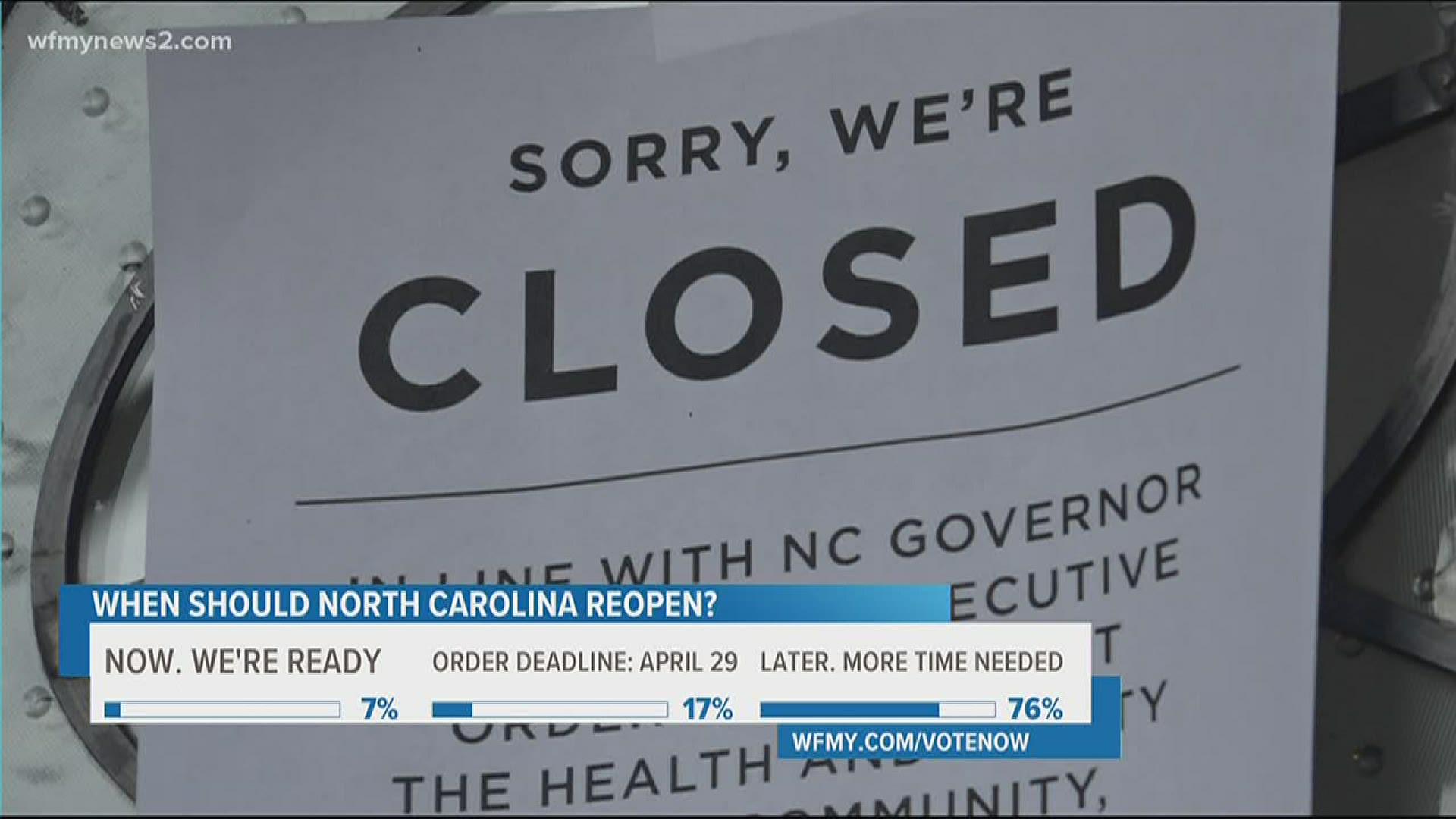GREENSBORO, N.C. — North Carolina’s stay-at-home order is set to expire at the end of the month on April 29. However, Governor Roy Cooper hasn’t made it known at this time if the stay-at-home order will be extended or modified.
The stay-at-home order for Greensboro, High Point, and Guilford County is set to expire on Thursday. Right now, it’s also unknown whether the city or county will extend or lift the order. Regardless, the state's executive order applies to these areas which includes the more restrictive rule of staying at home until April 29.
Governor Roy Cooper outlined a plan going forward for how they will evaluate easing or lifting restrictions while protecting against a dangerous second wave of the coronavirus.
RELATED: Q&A with Gov. Cooper: When will students go back to school and will stay-at-home order be extended?
“This virus is going to be with us until there is a vaccine, which may be a year or more away,” said Governor Cooper. “That means that as we ease restrictions, we are going to enter a new normal. We want to get back to work while at the same time preventing a spike that will overwhelm our hospitals with COVID-19 cases.”
Gov. Cooper said expert modeling shows it would be dangerous to lift restrictions all at once because it could result in hospitals becoming overwhelmed and unable to care for severely ill patients.
He said the changes in future restrictions must still protect public health, especially those most vulnerable to severe illness, including people over age 65, those with underlying health conditions and people living in congregate settings.
“Experts tell us it would be dangerous to lift our restrictions all at once. Rather than an on/off light switch, we are viewing this as a dimmer switch that can be adjusted incrementally,” said Governor Cooper.
Gov. Cooper said in order to ease restrictions the state needs to make progress in three areas: testing, tracing and trends.
The state has released the following information on all three areas.
TESTING
State planning relies on an increase in testing capabilities to identify, isolate and track new cases of COVID-19. This means having the supplies and lab capacity to do more testing across the state. Dr. Mandy Cohen, Secretary of the Department of Health and Human Services, has brought together laboratory partners from the public and private sector to coordinate efforts to ensure testing – diagnostic and antibody - is widely available across the state while also conserving protective equipment.
TRACING
Tracing requires the state to boost the public health workforce and ability to trace contacts of new cases of COVID-19. Contact tracing can be effective at containing new outbreaks, but it requires more personnel. When a person tests positive, the tracing efforts will help identify who that individual may have been in contact with so those people can get tested and take the right precautions. NC DHHS is working with its partners to increase this critical piece of our public health workforce. New digital tools can also help scale this effort.
TRENDS
In order to ease restrictions, the state needs to understand how COVID-19 is impacting the state and impacting specific populations and regions of the state to determine when to strengthen or ease social distancing policies. Trends that will influence policy decisions will be based on data like the new positive cases, hospitalizations, deaths, as well as available supply of personal protective equipment, hospital capacity.
Gov. Cooper said the state must look ahead as to how we stay ahead of the curve moving forward.
CORONAVIRUS NEWS
RELATED: Q&A with Gov. Cooper: When will students go back to school and will stay-at-home order be extended?
RELATED: The coronavirus through a senior's eyes | Senior draws a self-portrait with a strong message
FACTS NOT FEAR
Remember facts, not fear when talking about the coronavirus. You should take the same measures recommended by health leaders to prevent the spread of the flu and other viruses. That means washing your hands, avoiding touching your face, and covering coughs and sneezes.
WHERE YOU GET INFORMATION ABOUT THE CORONAVIRUS IS IMPORTANT
It is important to make sure the information you are getting about the coronavirus is coming directly from reliable sources like the CDC and NCDHHS. Be careful not to spread misinformation about coronavirus on social media.
NC CORONAVIRUS HOTLINE
The state also has a special hotline set up where you can call 2-1-1 or 866-462-3821 for more information on the coronavirus. You can also submit questions online at ncpoisoncontrol.org or select chat to talk with someone about the virus.
You can also text keyword VIRUS to WFMY News 2 at 336-379-5775 to find out more information.
Stay connected to local, national and breaking news: Download the new WFMY News 2 app.
►Text the keyword APP to 336-379-5775
►For the latest weather conditions and forecast text the keyword WEATHER to 336-379-5775
►For local news stories right to your phone text the keyword NEWS to 336-379-5775
►Need our Call for Action Team? Text keyword CFA to 336-379-5775
►For traffic alerts text the word TRAFFIC to 336-379-5775

